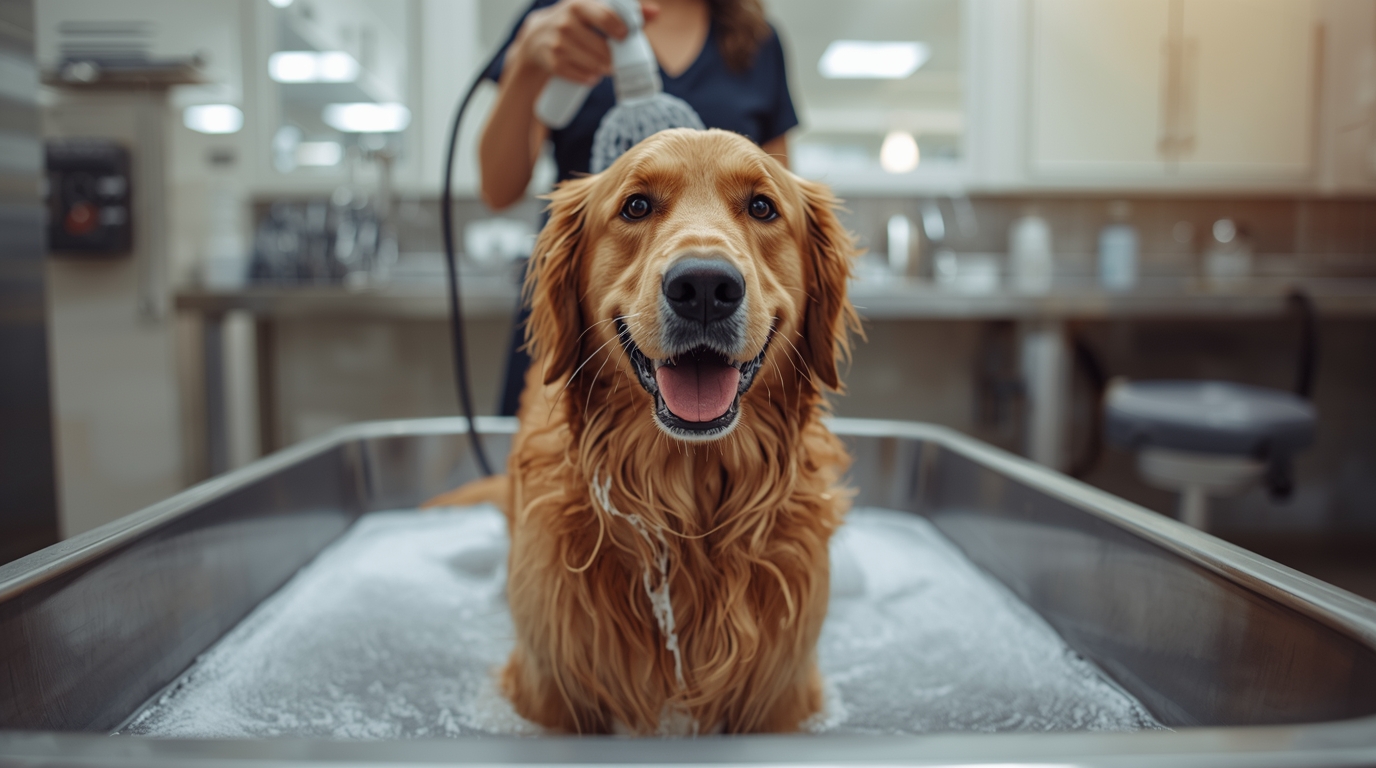Implementing comprehensive pet groomer background checks reduces liability exposure by up to 85% while building customer trust that directly impacts your bottom line. Professional screening programs for grooming staff prevent lawsuits averaging $35,000-$85,000 in the pet care industry while creating competitive advantages through enhanced safety messaging.
Key Takeaways
- Criminal history screening focusing on animal cruelty registries and theft records is mandatory for all pet grooming positions to protect animals and business assets.
- Professional verification including grooming school certification and previous employer checks ensures staff competency and reduces service liability risks.
- Mobile groomers require enhanced screening including motor vehicle records and equipment handling verification due to increased property access and transportation responsibilities.
- State-specific regulations vary significantly, with California, New York, and Florida requiring additional compliance measures beyond standard background checks.
- Screening costs range from $35-95 per employee depending on package comprehensiveness, with bulk discounts available for businesses screening 10+ groomers annually.
- Marketing screened staff as a premium service differentiator can justify 15-25% higher pricing while building customer confidence and loyalty.
A mobile pet groomer in Texas was charged with animal abuse after hidden camera footage revealed mistreatment. The business lost 80% of clients within 30 days. This devastating scenario highlights why pet groomer background checks have become essential for protecting both animals and business operations in today's transparent, social media-driven marketplace.
The pet grooming industry continues robust growth at 6.1% annually. However, this expansion brings unique risks that traditional background screening doesn't address. Unlike typical retail or office environments, pet grooming operations involve direct animal handling. They require access to expensive specialized equipment. Many operations involve unsupervised customer property access through mobile services.
Pet grooming business screening requires specialized approaches that consider animal welfare, customer emotional attachments, and industry-specific liability exposures. Standard employment verification misses critical risk factors. These factors can destroy grooming businesses overnight through viral social media incidents. They can also cause costly animal injury lawsuits. The financial impact is severe, with average lawsuit costs ranging from $35,000 to $85,000. Businesses without proper screening see insurance claim frequency increase by 12%.
Understanding Unique Risks in Pet Grooming Operations
Pet grooming operations face distinct challenges that make comprehensive dog groomer background screening absolutely critical for business survival. These risks extend far beyond typical employment concerns. They encompass animal welfare, specialized equipment access, and reputation vulnerabilities unique to the pet care industry. The emotional bond between pet owners and their animals intensifies liability concerns beyond typical workplace injuries.
A grooming incident that injures or traumatizes a beloved family pet can result in devastating social media backlash. Customer acquisition costs increase by 300% after incidents. Recovery timelines extend 60-90 days for reputation management. The pet care industry's reputation sensitivity means incidents spread rapidly through online reviews and social media platforms.
Animal Handling and Safety Concerns
Professional groomers work with stressed, anxious animals daily, requiring exceptional patience and proper training to prevent incidents. Animals under grooming stress may bite, scratch, or exhibit unpredictable behavior. Untrained or unsuitable staff cannot manage these situations safely. Previous animal cruelty incidents, domestic violence history, or anger management issues can indicate potential problems in high-stress animal handling situations.
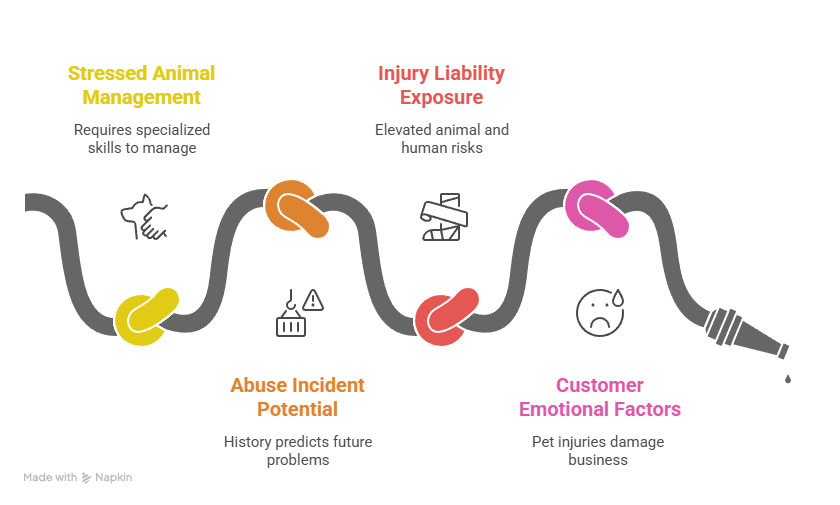
- Stressed animal management: Requires specialized skills and emotional stability
- Potential for abuse incidents: Previous history strongly predicts future problems
- Injury liability exposure: Both animal and human injury risks are elevated
- Customer emotional factors: Pet injuries create disproportionate business damage
Screening must identify candidates with demonstrated animal care competency and emotional stability. Animal welfare violations can result in criminal charges, business closure, and permanent reputation damage.
Business Equipment and Property Risks
Modern grooming operations represent significant equipment investments, with professional setups ranging from $15,000-$50,000+ including hydraulic tables, specialized clippers, dryers, and bathing systems. Staff access to valuable, portable equipment creates theft risks that standard retail background checks don't adequately address. Mobile grooming operations face additional vulnerabilities through unsupervised access to customer homes and properties. Chemical storage and sharp tool access require responsible staff who understand safety protocols.
They must not create liability through improper handling or storage. Pet salon background checks must verify candidates' understanding of professional grooming safety standards and chemical handling requirements. Equipment damage from improper use can cost thousands in repairs and replacement costs.
Essential Background Check Components for Pet Groomers
Effective pet groomer background check programs require multi-tiered screening approaches that address both standard employment risks and industry-specific concerns. The screening depth should match staff responsibilities and customer interaction levels. It must maintain legal compliance across all jurisdictions. Modern pet grooming business screening focuses on three critical areas: criminal history verification, professional credential validation, and role-specific risk assessment.
Each component serves distinct purposes while contributing to comprehensive risk management that protects animals, customers, and business operations. Insurance providers increasingly require documented screening programs before providing coverage for pet care businesses.
Criminal History Screening Requirements
Tier 1 mandatory searches form the foundation of responsible pet grooming business screening programs. Animal cruelty and abuse registry searches represent the most critical screening component. Previous animal mistreatment strongly predicts future incidents. Theft and property crime history checks protect against equipment theft and customer property access risks common in grooming operations.
| Screening Tier | Required Searches |
| Tier 1 - Mandatory | Animal cruelty registry, Theft crimes, Violent offenses, Drug-related charges |
| Tier 2 - Recommended | Multi-state database, Federal records, Sex offender registry, Domestic violence |
Tier 2 recommended searches provide comprehensive risk assessment for premium grooming positions or management roles. Multi-state criminal database searches catch offenses that occurred outside the primary hiring jurisdiction.
Professional Verification Standards
Grooming school certification verification ensures staff possess fundamental animal handling and grooming technique training required for safe operations. Many insurance providers offer premium discounts for businesses that verify formal grooming education. This makes verification cost-effective beyond risk reduction benefits.
Previous employer verification should specifically address animal handling incidents, customer complaints, and equipment care standards rather than generic employment confirmation. Professional reference checks require a minimum of three contacts from previous pet care or animal handling positions when available. References should specifically address animal handling capabilities, stress management, customer interaction skills, and reliability factors critical to grooming operations.
Types of Background Checks for Pet Care Industries
Pet grooming and pet care businesses require specialized screening packages that differ from standard employment background checks. Industry-specific screening focuses on animal welfare protection, customer trust building, and liability reduction. Standard packages miss critical risk factors unique to animal handling positions. Three primary screening types dominate the pet care industry: basic compliance screening, enhanced professional verification, and comprehensive risk assessment packages.
Basic screening covers mandatory criminal history and professional licensing verification. Enhanced packages add motor vehicle records, equipment handling experience, and customer service background verification.
| Screening Type | Coverage Areas | Typical Cost |
| Basic Compliance | Criminal history, Professional licenses | $35-45 |
| Enhanced Professional | Criminal + MVR + Employment verification | $55-75 |
| Comprehensive Risk | All components + Ongoing monitoring | $75-95 |
Comprehensive packages include ongoing monitoring services that alert employers to post-hire criminal activity or license issues. This monitoring typically costs $10-15 annually per employee but provides continuous risk management protection.
Specialized Screening for Different Roles
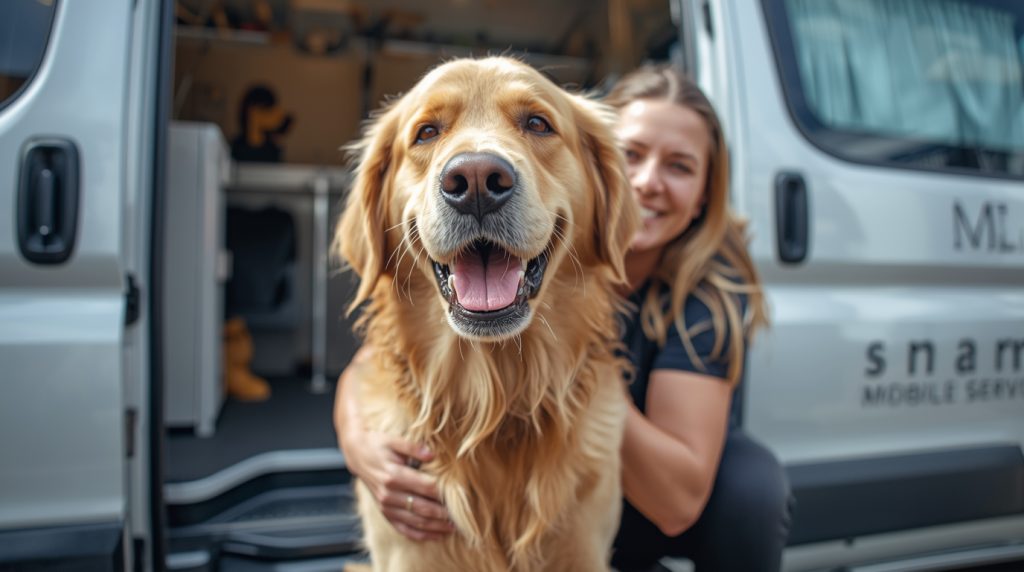
Mobile groomers require enhanced motor vehicle record checks and commercial driving history verification due to transportation responsibilities and equipment hauling requirements. Equipment handling experience verification ensures staff can safely operate expensive grooming tools and mobile unit systems without creating damage liability. Salon-based groomers need customer service background verification and retail theft history checks due to payment handling and retail product access responsibilities.
Cash handling verification becomes important for groomers who process payments directly rather than through centralized point-of-sale systems. Management positions require the most comprehensive screening including leadership background verification and business ethics assessment. Senior staff with equipment access, key holder responsibilities, or supervisory duties need enhanced screening regardless of work environment.
FCRA Compliance for Pet Grooming Background Checks
The Fair Credit Reporting Act governs how pet grooming businesses must conduct background screening to protect candidate rights while ensuring legal compliance. FCRA requirements apply to all consumer reports used for employment decisions, including criminal history, credit checks, and employment verification. Pet grooming employers must follow specific procedures for obtaining, reviewing, and acting on background check information. Proper FCRA compliance protects grooming businesses from costly lawsuits while ensuring candidates receive fair treatment throughout the screening process.
Violations can result in penalties up to $1,000 per incident plus attorney fees and punitive damages. Understanding these requirements is essential for any pet grooming business implementing background check programs. Many businesses partner with FCRA-compliant screening providers to ensure proper procedure adherence and documentation.
Required FCRA Notifications and Disclosures
Employers must provide clear, standalone written disclosure before conducting background checks that explains their intent to obtain consumer reports for employment decisions. This disclosure cannot be buried in application materials or employee handbooks. It must be a separate document that candidates can easily understand and review. Written authorization from candidates is required before conducting any background screening activities.
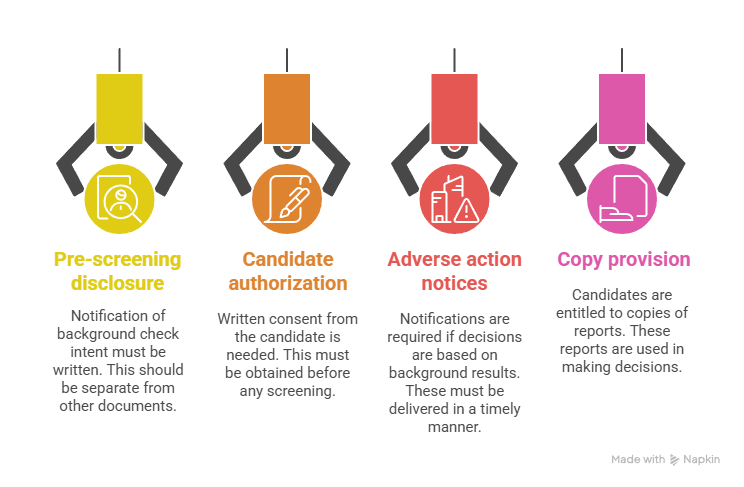
- Pre-screening disclosure: Separate written notification of background check intent
- Candidate authorization: Written consent before conducting any screening
- Adverse action notices: Required notifications if decisions based on background results
- Copy provision: Candidates entitled to copies of reports used in decisions
This authorization should specify what types of checks will be conducted and how results will be used in hiring decisions. Many employers combine disclosure and authorization into single documents for efficiency while maintaining compliance.
Adverse Action Procedures
When background check results lead to adverse employment decisions, employers must follow specific FCRA procedures to notify candidates and provide opportunity for dispute. The pre-adverse action process requires providing candidates with background report copies and summaries of rights before making final decisions. Final adverse action notices must be provided after decisions are made, including information about the consumer reporting agency used and candidate rights to dispute inaccurate information.
These procedures ensure candidates have opportunities to correct errors or provide context for concerning findings. Proper documentation of adverse action procedures protects employers from discrimination claims while ensuring legal compliance. Many screening providers offer FCRA compliance assistance and automated notification systems to simplify these processes.
Implementation Strategy for Grooming Business Screening
Successful pet grooming employee screening requires systematic policy development, appropriate package selection, and ongoing monitoring protocols that protect both business interests and legal compliance requirements. The implementation approach should scale with business size while maintaining consistent quality standards across all hiring decisions.
Professional grooming businesses need written screening policies that specify mandatory checks, evaluation criteria, and documentation requirements for legal protection and consistency. The policy should clearly define automatic disqualifiers versus case-by-case evaluation scenarios. This ensures fair and legally compliant hiring decisions.
Screening Policy Development Framework
Documentation requirements must meet employment law standards while creating records that support insurance claims and legal defense if needed. Sample policy frameworks should address timing requirements, ensuring background checks complete before first animal contact or equipment access. Ongoing monitoring protocols help identify post-hire issues that could affect animal safety or business operations.
Legal compliance frameworks must consider state-specific requirements, FCRA obligations, and equal employment opportunity standards. The policy should specify different screening levels based on job responsibilities, with mobile groomers receiving more comprehensive screening than supervised salon assistants. Clear communication protocols help candidates understand expectations while demonstrating the business's commitment to animal welfare and professional standards.
Volume Screening and Staffing Solutions
Implementation timelines typically follow 30-60-90 day phases for complete policy integration. Businesses screening 10+ groomers annually typically qualify for bulk program discounts of 15-20% while accessing specialized candidate pools with pre-verified grooming credentials. Staffing agencies specializing in pet care placements often maintain ongoing screening relationships. These reduce individual hiring costs and timeline pressures while providing access to pre-screened candidate pools.
- Bulk discount programs: 15-20% savings for 10+ annual screenings
- Pre-verified candidate pools: Reduced hiring timeline and screening costs
- Certification tracking: Automated monitoring of license renewals and education
- Priority processing: Faster turnaround for urgent hiring needs
Continuous monitoring options help identify post-hire criminal activity or license issues that could affect employment eligibility or insurance coverage. These monitoring systems typically add $10-15 per employee annually but provide ongoing risk management that prevents costly incidents from undetected post-hire issues.
State Regulations and Compliance Requirements
Pet grooming regulations vary significantly across states, with some jurisdictions requiring professional licensing while others rely primarily on business registration and general employment law compliance. Understanding state-specific requirements helps ensure screening programs meet minimum legal standards while supporting any professional licensing requirements and maintaining consistent hiring practices across multiple locations.
California requires professional pet grooming licensing in many municipalities, with background check requirements integrated into the licensing process. New York's health department regulations focus on sanitation and chemical safety compliance. Florida's animal welfare compliance standards require enhanced screening for animal cruelty indicators and previous citations related to animal care.
High-Regulation State Requirements
These high-regulation states typically provide clearer guidance on screening requirements but also impose more stringent penalties for non-compliance. Businesses operating in multiple states need screening programs that meet the highest applicable standards across all jurisdictions. Professional licensing integration becomes essential for efficient hiring and ongoing compliance management.
- California licensing: Municipal requirements with integrated background checks
- New York health codes: Sanitation and chemical safety verification requirements
- Florida animal welfare: Enhanced animal cruelty screening and ongoing monitoring
Background check results often directly impact professional grooming license eligibility, making coordination between screening and licensing processes essential for efficient hiring. Some states require specific criminal background check formats or approved screening providers for license applications.
Professional Licensing Integration
Professional development tracking through screening providers can automatically monitor continuing education requirements and license renewal deadlines. This integration reduces administrative burden while ensuring staff maintain required certifications throughout their employment. Certification maintenance documentation provides insurance benefits and liability protection during incident investigations.
Renewal requirement coordination helps ensure ongoing compliance without duplicate screening costs. Many states allow background check results to satisfy both employment and licensing requirements when conducted through approved providers. This coordination reduces costs while ensuring comprehensive compliance across all regulatory requirements.
Marketing Your Screened Grooming Staff
Comprehensive pet salon background checks create significant marketing advantages that justify screening costs through premium pricing and enhanced customer trust. Effective communication of screening programs builds competitive differentiation while addressing customer concerns about animal safety and service quality. Pet owners increasingly research grooming businesses online before selecting services, making screening program transparency a powerful marketing tool.
Website content should clearly communicate screening standards without revealing specific candidate information or creating privacy concerns. Social media safety messaging helps build trust while educating customers about professional grooming industry standards.
Customer Communication Strategies
Trust-building marketing materials can include certifications, insurance coverage levels, and professional association memberships that demonstrate commitment to animal welfare and service quality. Customer testimonials specifically mentioning staff professionalism and animal handling skills reinforce screening program benefits. Review platform optimization should encourage satisfied customers to mention staff competency and trustworthiness in their feedback.
Premium pricing justification becomes easier when customers understand the additional costs and risks involved in comprehensive screening programs. Businesses can typically charge 15-25% higher rates when marketing screened, certified staff as a premium service differentiator. This pricing strategy often improves profit margins enough to fully offset screening costs while attracting quality-conscious customers.
Interpreting Screening Results and Red Flags
Professional pet groomer background check result interpretation requires understanding both automatic disqualifiers and situational factors that merit case-by-case evaluation. Legal consultation becomes essential for complex cases involving older offenses, rehabilitation evidence, or state-specific regulations that affect hiring decisions. Animal cruelty convictions represent automatic disqualifiers regardless of timeframe or circumstances. Pet owner trust and animal safety cannot be compromised in these situations.
Recent theft convictions create too much risk for positions involving equipment access and customer property exposure. Violent crime history, particularly domestic violence or anger management issues, indicates potential problems in high-stress animal handling situations.
Critical Disqualification Factors
Drug-related offenses require careful evaluation of timing, severity, and rehabilitation evidence. Some situations may be acceptable with proper safeguards and monitoring protocols. Documentation requirements for all hiring decisions help protect against discrimination claims while maintaining consistent application of screening standards.
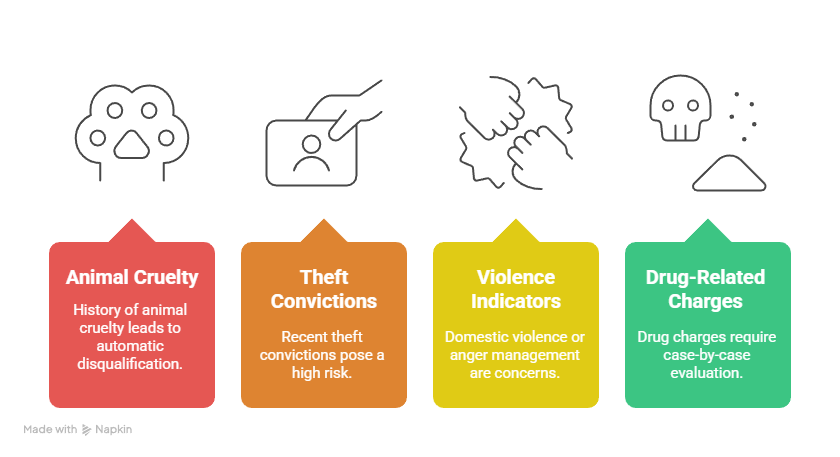
- Animal cruelty history: Automatic disqualification regardless of circumstances
- Recent theft convictions: Too high risk for equipment and property access
- Violence indicators: Domestic violence or anger management concerns
- Drug-related charges: Case-by-case evaluation with rehabilitation consideration
Case-by-case evaluation criteria should consider offense timing, severity, relevance to job duties, and candidate rehabilitation efforts. Businesses need clear documentation protocols that demonstrate fair and consistent application of screening standards across all candidates. Professional legal review helps ensure compliance with ban-the-box laws and fair chance hiring requirements in applicable jurisdictions.
Cost-Benefit Analysis of Grooming Staff Screening
The investment in comprehensive pet groomer background checks typically generates positive return on investment within 6-12 months through reduced liability exposure, insurance premium discounts, and premium pricing opportunities. Insurance providers often offer 10-25% premium discounts for businesses implementing comprehensive screening programs. These discounts alone can offset screening costs for many operations.
Average lawsuit costs in the pet grooming industry range from $35,000-$85,000, while comprehensive screening programs cost $35-95 per employee. The mathematics clearly favor prevention through proper screening over incident response and legal defense. Revenue protection through reputation management represents additional value that's difficult to quantify but essential for long-term business sustainability. Businesses without proper screening see customer acquisition costs increase by 300% after incidents, while reputation recovery typically requires 60-90 days with aggressive management efforts. Premium pricing opportunities for screened, certified staff can justify 15-25% higher rates, often generating enough additional revenue to fund comprehensive screening programs while improving overall profitability.
Conclusion
Implementing comprehensive pet groomer background check programs protects animals, customers, and business operations while creating marketing advantages that offset screening costs through premium pricing opportunities. The investment in proper screening typically pays for itself through reduced liability exposure, insurance benefits, and customer trust building that drives long-term business growth. Professional grooming businesses that prioritize safety through thorough screening establish competitive advantages in an increasingly quality-conscious market while building sustainable operations that protect all stakeholders. The cost of prevention through proper screening remains far lower than the financial and reputational costs of incidents that comprehensive background checks could have prevented.
Frequently Asked Questions
How much do pet groomer background checks typically cost?
Pet groomer background checks range from $35-55 for basic salon positions to $75-95 for comprehensive mobile groomer screening packages. Volume discounts of 15-20% are available for businesses screening 10+ employees annually, and many packages include ongoing monitoring options for an additional $10-15 per employee per year.
What criminal history automatically disqualifies pet grooming candidates?
Animal cruelty or abuse convictions represent automatic disqualifiers for pet grooming positions regardless of timeframe. Recent theft convictions, violent crimes, and drug-related offenses typically require case-by-case evaluation considering timing, severity, and rehabilitation evidence, with legal consultation recommended for complex situations.
Are background checks required by law for pet groomers?
Background check requirements vary by state and municipality, with California, New York, and Florida having stricter regulations. While not universally mandated by law, most insurance providers require or offer discounts for comprehensive screening, and professional licensing in some areas includes background check components.
How long does pet groomer background screening take?
Standard pet groomer background checks typically complete within 3-5 business days for most candidates. Complex cases involving multiple states or professional verification may require 7-10 business days, while rush processing options are available from most screening providers for urgent hiring needs.
What's included in mobile groomer background check packages?
Mobile groomer screening packages typically include criminal history, motor vehicle records, previous employer verification, and equipment handling experience checks. Enhanced packages may include ongoing monitoring, professional certification tracking, and customer property access risk assessment components.
Can businesses screen existing grooming staff retroactively?
Yes, businesses can implement background screening for existing employees, but must follow proper notification procedures and state-specific requirements for current employee screening. Many businesses phase in screening during performance reviews or license renewal periods to minimize disruption while improving overall risk management.
Additional Resources
- Fair Credit Reporting Act Compliance Guide for Employers
https://www.ftc.gov/business-guidance/resources/using-consumer-reports-what-employers-need-know - Professional Animal Care Certification Association Guidelines
https://www.pacca.org/certification-standards - Pet Industry Joint Advisory Council Grooming Standards
https://www.pijac.org/grooming-industry-standards - National Dog Groomers Association Professional Requirements
https://www.nationaldoggroomers.com/certification-programs - State-by-State Pet Grooming Licensing Requirements Database
https://www.professional-grooming-standards.org/state-requirements - Small Business Administration Guide to Employee Screening
https://www.sba.gov/business-guide/manage-your-business/hire-retain-employees

GCheck Editorial Team
Meet the GCheck Editorial Team, your trusted source for insightful and up-to-date information in the world of employment background checks. Committed to delivering the latest trends, best practices, and industry insights, our team is dedicated to keeping you informed.
With a passion for ensuring accuracy, compliance, and efficiency in background screening, we are your go-to experts in the field. Stay tuned for our comprehensive articles, guides, and analysis, designed to empower businesses and individuals with the knowledge they need to make informed decisions.
At GCheck, we're here to guide you through the complexities of background checks, every step of the way.
